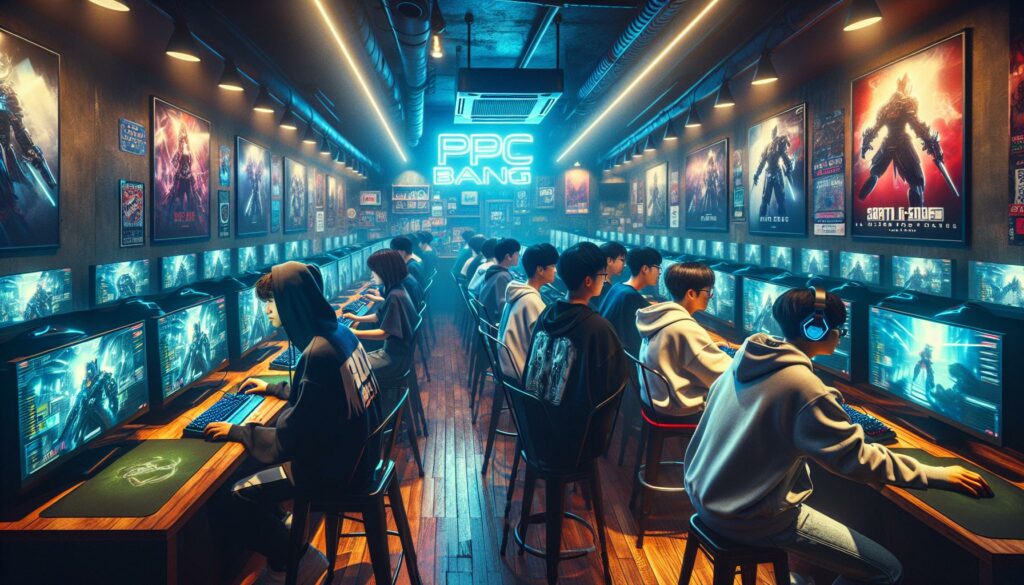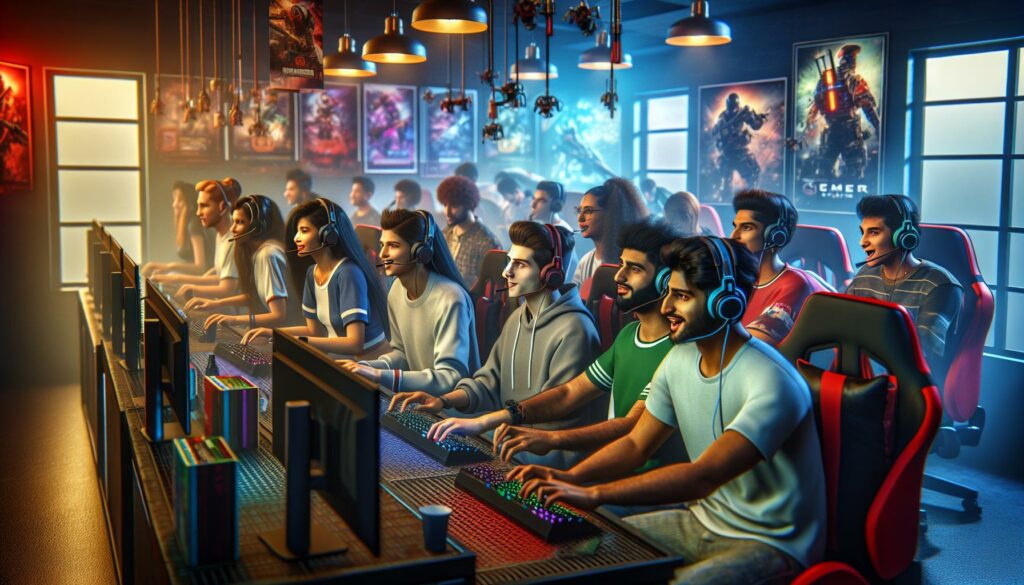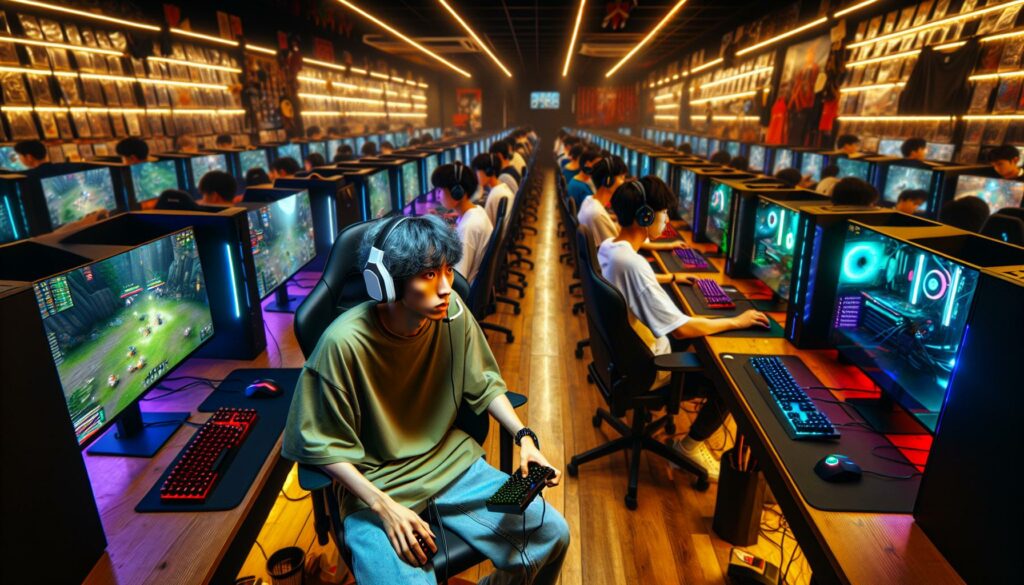South Korea stands at the forefront of global gaming culture, where professional gamers achieve rock star status and gaming cafes light up streets like modern-day digital temples. It’s a nation where parents send their kids to gaming academies and esports tournaments fill Olympic-sized stadiums. Welcome to the gaming capital of the world.
In this tech-savvy society, gaming isn’t just a hobby – it’s woven into the fabric of daily life. From Seoul’s bustling Gangnam district to the quiet suburbs of Busan, PC bangs (Korean gaming cafes) serve as social hubs where friends gather, compete, and forge digital destinies. The country’s lightning-fast internet infrastructure and competitive spirit have created a perfect storm for gaming excellence, making South Korea the birthplace of professional gaming as we know it today.
Korean Gaming Culture
South Korea’s gaming industry emerged in the 1990s following the government’s investment in nationwide broadband infrastructure. This technological foundation transformed gaming from a casual hobby into a cultural phenomenon.
Internet Cafes and PC Bang Culture
PC bangs revolutionized South Korea’s gaming landscape as 24-hour gaming cafes equipped with high-speed internet connections. These establishments charge $1-2 per hour for access to premium gaming setups featuring the latest hardware specifications. PC bangs serve as social hubs where gamers gather to compete in popular titles like League of Legends StarCraft multiplayer games. The facilities provide additional amenities including snack services beverages gaming peripherals private cubicles. South Korea houses over 12,000 PC bangs across major cities reaching peak popularity during the early 2000s when they attracted 25 million monthly visitors.
Professional Gaming as a Career Path
Professional gaming in South Korea offers structured career progression through established esports organizations teams academies. Top players earn $200,000-500,000 annually through tournament winnings sponsorships streaming contracts. Major telecommunications companies SK Telecom KT Corporation maintain professional teams competing in global championships. Professional gamers receive specialized training in dedicated facilities covering gameplay strategy physical conditioning mental preparation team coordination. The Korean e-Sports Association (KeSPA) regulates professional gaming establishing standardized contracts player protections competition guidelines. South Korean universities offer esports scholarships degrees preparing students for careers in professional gaming content creation event management.
South Korean Gaming Industry
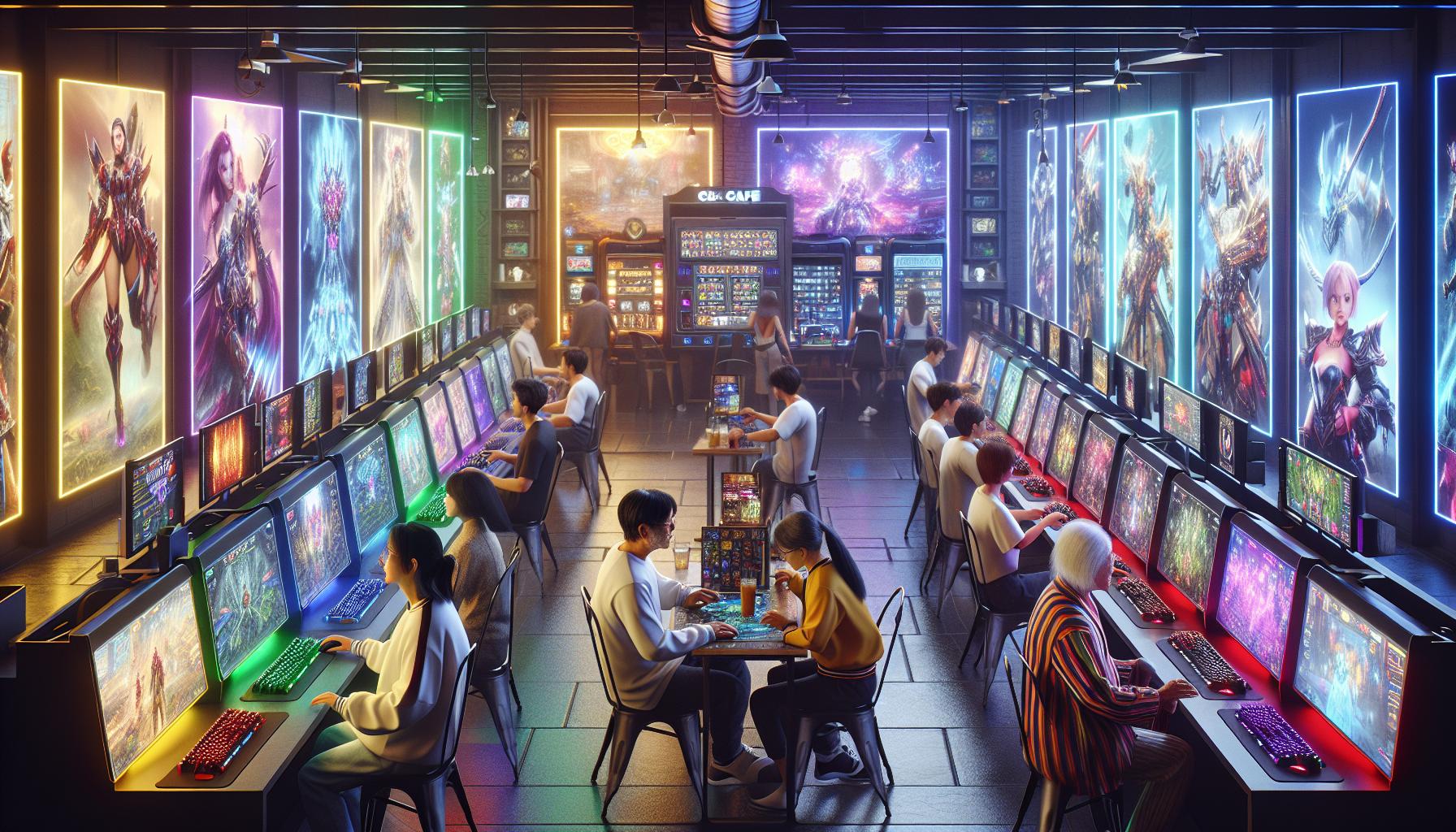
South Korea’s gaming industry generates $16.6 billion in annual revenue. The market combines innovative game development with strategic global expansion initiatives.
Major Game Developers and Publishers
Nexon leads South Korea’s gaming sector with flagship titles like MapleStory reaching 180 million registered players globally. NCSoft dominates the MMORPG market through franchises like Lineage which generates $1.2 billion in yearly revenue. Pearl Abyss gained international recognition with Black Desert Online attracting 40 million players across 150 countries. Netmarble specializes in mobile gaming with titles like Seven Knights earning $800 million annually. These companies invest 30% of their revenue in research development creating innovative gaming technologies.
Mobile Gaming Revolution
South Korea’s mobile gaming market reached $7.3 billion in 2023. Kakao Games leverages its social platform of 45 million users to distribute mobile titles. Com2uS transformed the mobile RPG landscape with Summoners War generating $2.5 billion in lifetime revenue. The market sees 25 million daily active mobile gamers spending an average of 2 hours on gaming apps. Local developers optimize games for 5G networks providing console-quality experiences on mobile devices. Cross-platform integration enables seamless gameplay between PC PC bang mobile platforms.
Esports and Competitive Gaming

South Korea stands as the global epicenter of competitive gaming, pioneering professional esports leagues and establishing structured tournament systems. The country’s esports industry generates $250 million annually through broadcasts, sponsorships and merchandise sales.
Professional Leagues and Tournaments
Korea’s professional gaming infrastructure centers around premier leagues like League of Legends Champions Korea (LCK) and Global StarCraft League (GSL). These tournaments operate with structured seasons, playoffs and championship events drawing 100,000+ live spectators. Major broadcasting networks dedicate prime-time slots to competitive matches, reaching 4 million viewers per event. The prize pools exceed $500,000 for major tournaments, while championship events at venues like Seoul’s Sangam Stadium sell out within minutes. Korean teams dominate international competitions, securing 75% of world championship titles across major esports titles.
Celebrity Status of Pro Gamers
Top Korean pro gamers command significant public influence with social media followings exceeding 3 million subscribers. Players like Faker earn $4.6 million annually through tournament winnings, streaming revenue and endorsement deals with global brands. Popular gaming stars appear on mainstream television shows, magazine covers and commercial advertisements. Lee “Faker” Sang-hyeok’s matches generate 15 million concurrent viewers globally. Pro gamers receive dedicated fan clubs, merchandise lines and promotional events similar to K-pop idols. Gaming agencies manage player schedules including media appearances, fan meetings and brand partnerships valued at $10 million annually.
Social Aspects of Korean Gaming
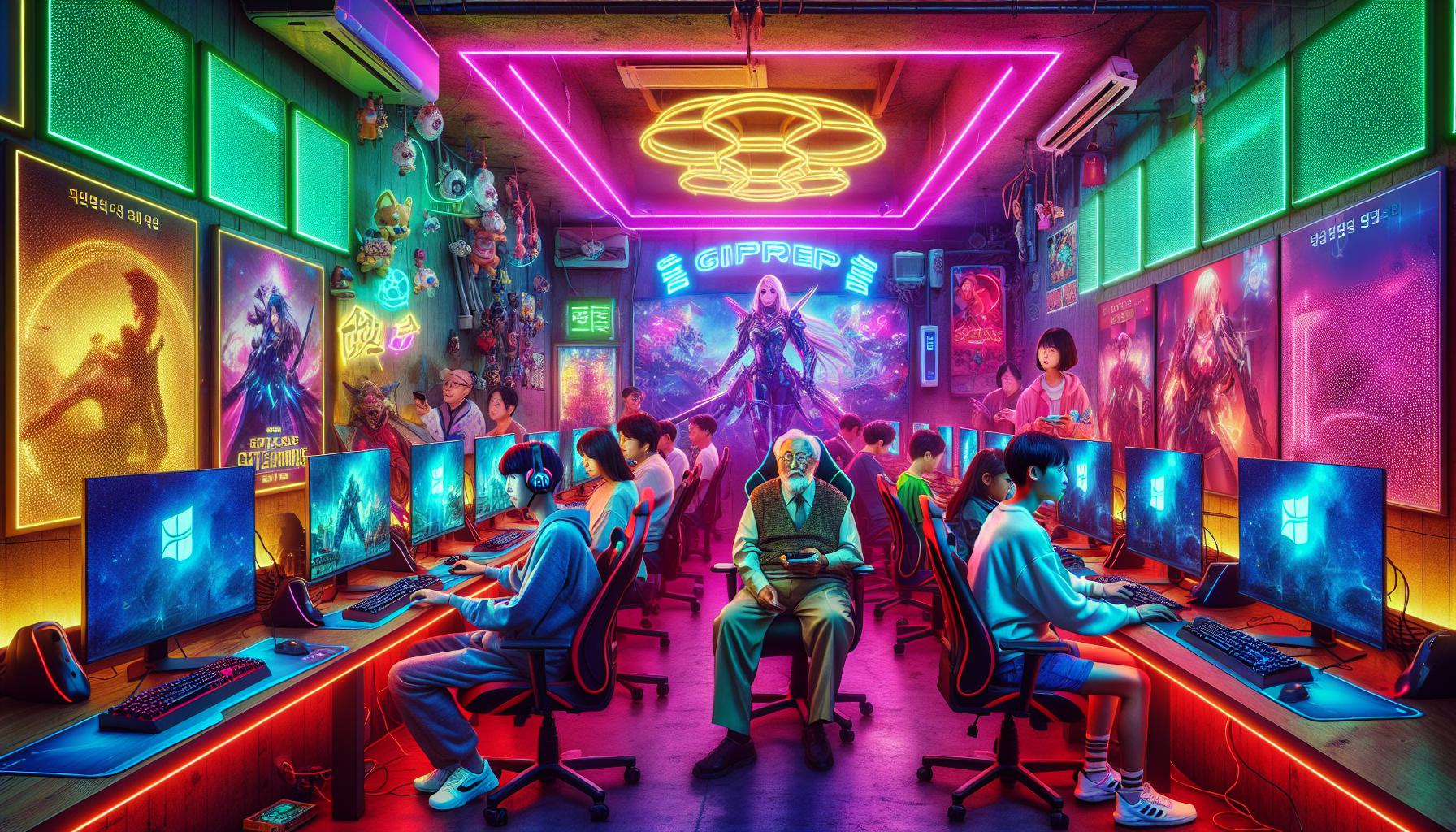
Gaming in South Korea transcends mere entertainment, forming intricate social networks that connect millions of players across generations. The social fabric of Korean gaming culture interweaves community engagement, family dynamics and educational pursuits.
Gaming Communities and Social Bonds
PC bangs serve as primary social hubs where gamers forge lasting friendships through shared gaming experiences. These venues host regular community events, tournaments and social gatherings that attract 25,000+ daily visitors. Gaming clubs at universities connect 150,000+ students nationwide through discord servers, meetups and competitive leagues. Online gaming communities on platforms like KakaoTalk feature specialized groups with 500,000+ members who coordinate gameplay sessions, share strategies and organize offline meetings. Professional gaming teams maintain active fan communities exceeding 2 million members who participate in meet-and-greets, viewing parties and exclusive events.
Family and Educational Perspectives
Parents actively support their children’s gaming interests through structured training programs at 200+ gaming academies nationwide. These academies enroll 50,000+ students annually in courses covering game mechanics, strategy and professional development. Educational institutions integrate gaming-related curricula into their programs, with 35 universities offering dedicated esports majors. Gaming achievements appear on academic resumes, as 65% of top universities consider competitive gaming experience in their admissions process. Family gaming centers attract 15,000+ monthly visitors where parents join their children in multiplayer games, strengthening familial bonds through shared digital experiences.
Gaming Addiction and Regulations
South Korea’s gaming culture faces significant challenges related to excessive gaming habits among its population. The government implemented comprehensive measures to address gaming-related health concerns while maintaining the industry’s growth.
Government Policies and Restrictions
The Shutdown Law (제한법) introduced in 2011 restricts online gaming access for players under 16 between midnight and 6 AM. Korea’s Ministry of Culture Sports and Tourism established a gaming addiction classification system that categorizes players based on usage patterns. Internet gaming companies must implement mandatory breaks after 2 hours of continuous play. The Game Rating and Administration Committee monitors content ratings enforcing age restrictions across 85% of gaming platforms. Registration requirements mandate gamers to use their national ID numbers for account creation limiting multiple account abuse.
Support Systems and Treatment
Korea’s National Center for Gaming Disorder operates 14 specialized clinics providing free treatment programs. Professional counselors at the Wake Up Centers assist 25,000 individuals annually through cognitive behavioral therapy sessions. The Internet Addiction Prevention Center maintains a 24/7 hotline receiving 1,200 calls monthly. Gaming companies contribute $50 million annually to addiction prevention programs funding rehabilitation facilities. Support groups connect 15,000 recovering gaming addicts through weekly meetings at 200 locations nationwide. Educational institutions integrate gaming literacy programs reaching 500,000 students teaching responsible gaming practices.
| Gaming Addiction Statistics | Numbers |
|---|---|
| Treatment Centers | 14 |
| Annual Patients Treated | 25,000 |
| Monthly Hotline Calls | 1,200 |
| Support Group Locations | 200 |
| Prevention Program Funding | $50M |
| Students in Gaming Literacy | 500,000 |
Gamers Become Superstars
South Korea’s gaming culture stands as a testament to how technology and social dynamics can reshape entertainment into a cultural cornerstone. The nation has successfully transformed gaming from a casual pastime into a respected professional pursuit complete with structured career paths and educational opportunities.
While challenges like gaming addiction persist the government’s proactive approach demonstrates its commitment to fostering a healthy gaming environment. Through world-class infrastructure dedicated facilities and comprehensive support systems South Korea continues to lead the global gaming industry’s evolution.
The fusion of competitive spirit social connection and technological innovation has created a unique ecosystem that influences gaming cultures worldwide. As South Korea moves forward it’s clear that its gaming industry will remain a powerful force in shaping the future of digital entertainment.

